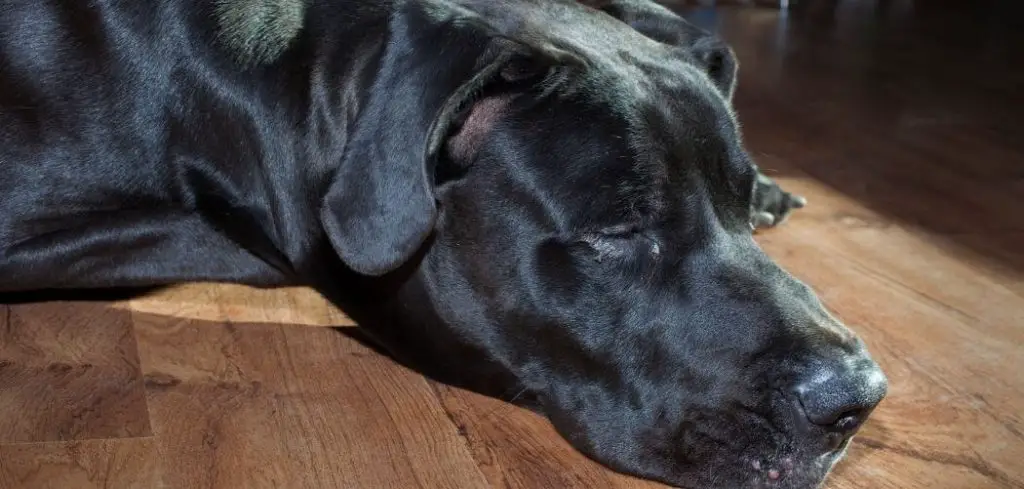When your dog suddenly stops eating and begins snoring more frequently or loudly, it can be both puzzling and worrisome. These two symptoms might seem unrelated, but they can actually point to underlying health issues that deserve attention.
We outline the common causes of dog not eating and snoring, what you can do at home, and when to seek veterinary help.
Table of Contents
Dog Not Eating and Snoring — Why It Happens
A dog that is not eating and snoring excessively may be dealing with respiratory issues, oral pain, obesity, or a combination of sleep disturbances and illness. Snoring is often caused by airway obstruction or anatomical features, while appetite loss can be a sign of discomfort, nausea, or systemic disease.
When both occur together, it’s important to investigate possible interrelated causes such as upper respiratory infections, dental disease, or even sleep apnea in overweight dogs.

Common Causes of Dog Not Eating and Snoring
Upper Respiratory Infections
Dogs suffering from colds, kennel cough, or other respiratory infections often experience congestion and inflammation in the nasal passages and throat.
This can cause them to snore during sleep due to partially blocked airways.
At the same time, their appetite may decrease because they can’t smell food as well or are feeling generally unwell.
These infections can become more serious if left untreated and may lead to lethargy, fever, and coughing.
Obesity and Sleep Apnea
Excess weight, especially around the neck and chest, can contribute to obstructed breathing and snoring.
Obese dogs are more likely to suffer from sleep apnea, where breathing momentarily stops during sleep.
This not only affects their sleep quality but can also leave them feeling tired and less likely to eat normally.
Long-term obesity can also lead to joint pain and organ strain, contributing further to appetite loss.
Read more: Dog Breathing Heavy and Not Eating (How to spot signs of trouble)
Brachycephalic Syndrome
Flat-faced breeds like Bulldogs, Pugs, and Shih Tzus are prone to brachycephalic obstructive airway syndrome (BOAS).
This condition causes chronic snoring due to narrowed nostrils, elongated soft palates, or other structural issues.
These breathing difficulties can be exhausting, reducing a dog’s interest in food and contributing to fatigue.
Affected dogs may also pant excessively, have noisy breathing while awake, and experience trouble during physical activity.
Dental Disease or Mouth Pain
If your dog is experiencing mouth pain from infected teeth, gum disease, or an oral mass, they may not want to eat.
Mouth discomfort can also cause snoring if there’s inflammation or swelling affecting the tongue or soft palate.
Owners may notice bad breath, pawing at the mouth, drooling, or dropping food while eating.
Dental issues are very common, especially in older dogs and small breeds, and often go unnoticed until appetite or behavior changes.
Fatigue or Systemic Illness
Systemic diseases such as liver or kidney problems, diabetes, or even cancer can leave a dog lethargic and uninterested in food.
Fatigue can contribute to deeper or heavier snoring if a dog is sleeping more than usual.
In these cases, snoring isn’t caused by airway obstruction but by a general increase in sleep and lack of energy.
This combination of signs often warrants thorough veterinary evaluation to determine the underlying cause.
What to Do If Your Dog Is Not Eating and Snoring
First, observe how long your dog has been showing these symptoms and whether there are any other changes in behavior, breathing, or physical appearance.
If your dog has a stuffy nose, you can try gently wiping their nostrils and using a humidifier to ease breathing.
Warm, strong-smelling foods like cooked chicken or dog-safe broth may help stimulate appetite, especially if your dog’s sense of smell is affected.
For dogs that are overweight, consult your vet about a safe weight loss plan—losing a few pounds can significantly improve breathing.
Ensure your dog sleeps on a comfortable, elevated surface with their head supported to promote easier airflow.
When to Call or Visit Your Vet
If your dog has not eaten in more than 24 hours, especially if snoring is accompanied by labored breathing, it’s time to call your vet.
Seek urgent care if your dog:
Appears to struggle to breathe while awake or asleep
Has nasal discharge, especially if green or bloody
Is coughing, sneezing excessively, or wheezing
Shows signs of pain while chewing or has swollen gums
Seems lethargic, weak, or uninterested in surroundings
These signs could indicate an infection, airway blockage, or another serious medical condition that requires prompt attention.
Read more: Dog Gagging and Not Eating (Why it happens)
Key Takeaway
When your dog is not eating and snoring, it’s important to consider both symptoms together rather than in isolation.
Issues like respiratory infections, obesity, dental pain, and chronic illness can all impact your dog’s breathing and appetite.
With gentle observation, a few at-home measures, and timely veterinary support, most causes can be diagnosed and treated effectively.
Trust your instincts—if your dog seems “off,” especially with these two symptoms, it’s always safer to check in with your vet.
